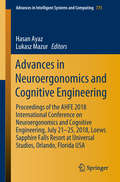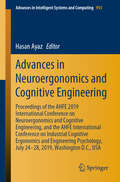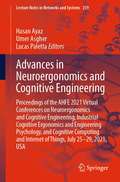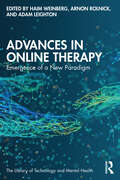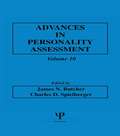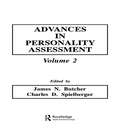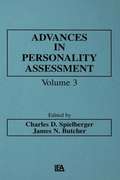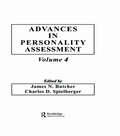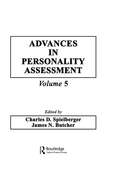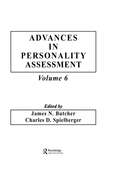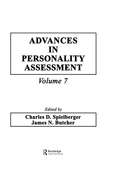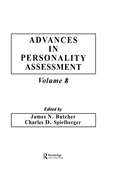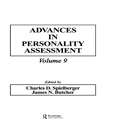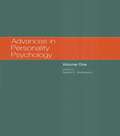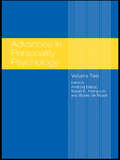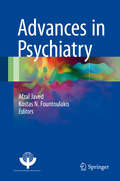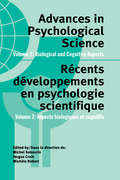- Table View
- List View
Advances in Neuroergonomics and Cognitive Engineering: Proceedings of the AHFE 2018 International Conference on Neuroergonomics and Cognitive Engineering, July 21–25, 2018, Loews Sapphire Falls Resort at Universal Studios, Orlando, Florida USA (Advances in Intelligent Systems and Computing #775)
by Hasan Ayaz Lukasz MazurThis book offers a broad perspective on the field of cognitive engineering and neuroergonomics, covering emerging practices and future trends toward the harmonious integration of human operators and computer systems. It presents novel theoretical findings on mental workload and stress, activity theory, human reliability, error and risk, and neuroergonomic measures alike, together with a wealth of cutting-edge applications. Further, the book describes key advances in our understanding of cognitive processes, including mechanisms of perception, memory, reasoning, and motor response, with a special emphasis on their role in interactions between humans and other elements of computer-based systems. Based on the AHFE 2018 affiliated conference on Neuroergonomics and Cognitive Engineering, held on July 21–25, 2018, in Orlando, Florida, USA, it provides readers with a comprehensive overview of the current challenges in cognitive computing and factors influencing human performance.
Advances in Neuroergonomics and Cognitive Engineering: Proceedings of the AHFE 2019 International Conference on Neuroergonomics and Cognitive Engineering, and the AHFE International Conference on Industrial Cognitive Ergonomics and Engineering Psychology, July 24-28, 2019, Washington D.C., USA (Advances in Intelligent Systems and Computing #953)
by Hasan AyazThis book offers a broad perspective on the field of cognitive engineering and neuroergonomics, covering emerging practices and future trends toward the harmonious integration of human operators and computer systems. It presents novel theoretical findings on mental workload and stress, activity theory, human reliability, error and risk, and neuroergonomic measures alike, together with a wealth of cutting-edge applications. Further, the book describes key advances in our understanding of cognitive processes, including mechanisms of perception, memory, reasoning, and motor response, with a special emphasis on their role in interactions between humans and other elements of computer-based systems. Based on the AHFE 2019 affiliated conference on Neuroergonomics and Cognitive Engineering, held on July 24-28, 2019, in Washington D.C., USA, it provides readers with a comprehensive overview of the current challenges in cognitive computing and factors influencing human performance.
Advances in Neuroergonomics and Cognitive Engineering: Proceedings of the AHFE 2021 Virtual Conferences on Neuroergonomics and Cognitive Engineering, Industrial Cognitive Ergonomics and Engineering Psychology, and Cognitive Computing and Internet of Things, July 25-29, 2021, USA (Lecture Notes in Networks and Systems #259)
by Hasan Ayaz Umer Asgher Lucas PalettaThis book offers a broad overview of the field of cognitive engineering and neuroergonomics, covering emerging practices and future trends toward the harmonious integration of human operators and computational systems. It gathers both theoretical and practice-oriented studies on mental workload and stress, activity theory, human reliability, error and risk. It covers applications in various field, and corresponding strategies to make assistive technologies more user-oriented. Further, the book describes key advances in our understanding of cognitive processes, including mechanisms of perception, memory, reasoning, and motor response, with a particular focus on their role in interactions between humans and other elements of computer-based systems. Gathering the proceedings of the AHFE 2021 Conferences on Neuroergonomics and Cognitive Engineering, Industrial Cognitive Ergonomics and Engineering Psychology, and Cognitive Computing and Internet of Things, held virtually on July 25-29, 2021, from USA, this book offers extensive information and a thought-provoking guide for researchers and practitioners in cognitive engineering, neuroergonomics and their applications.
Advances in Online Therapy: Emergence of a New Paradigm
by Haim Weinberg Arnon Rolnick Adam LeightonAdvances in Online Therapy is the definitive presentation on online psychological intervention, which takes research and experiences of online therapy a step further by applying them to therapy in a post-pandemic world. This book addresses most of the main approaches and schools of individual, couple and family psychotherapy that are prevalent in the therapeutic field nowadays and explores how each of them adjust to online therapy. The reader will explore the main challenges and obstacles unique for each approach and how leading experts of those approaches overcome these challenges. The book also offers a relatively unique collection of the most practiced therapeutic approaches. In addition, the reader will explore specific issues that anyone who meets clients online should be aware of, like who is suitable for online counseling and who should be excluded, how to overcome resistance to online meetings, how to create online therapeutic alliance, enhancing online presence, and more. This book develops further the ideas and areas explored in the authors’ previous book, Theory and Practice of Online Therapy. Advances in Online Therapy aims to help mental health professionals and graduate students responsibly explore and expand their own ‘online comfort zone’.
Advances in Personal Relationships: Personality and Close Relationship Processes
by Stanley O. Gaines Jr.Few observers of relationship dynamics would dispute the claim of interdependence theorists that a defining feature of close relationships is the extent to which partners influence each other's thoughts, feelings, or behaviors. However, partners do not behave simply in response to each other's behavior; both partners in a given relationship bring themselves - indeed, their selves - into the relationship as well. Not only are individuals' selves enormously complex and rich in content, but so too are the multitude of personality characteristics, including traits, values, attitudes, motives, and emotions, that contribute to selves' richness. Gaines, Jr provides a major integration of research on personality with research on relationship science, and demonstrates how personality constructs can be readily incorporated into the two most influential theories of close relationships: attachment theory and interdependence theory. This study will be of value to scholars in the fields of close relationships, personality psychology, communication studies, and family studies.
Advances in Personal Relationships: Positive Approaches to Optimal Relationship Development
by Knee C. Raymond Reis Harry T.How can we get the most out of our close relationships? Research in the area of personal relationships continues to grow, but most prior work has emphasized how to overcome negative aspects. This volume demonstrates that a good relationship is more than simply the absence of a bad relationship, and that establishing and maintaining optimal relationships entails enacting a set of processes that are distinct from merely avoiding negative or harmful behaviors. Drawing on recent relationship science to explore issues such as intimacy, attachment, passion, sacrifice, and compassionate goals, the essays in this volume emphasize the positive features that allow relationships to flourish. In doing so, they integrate several theoretical perspectives, concepts, and mechanisms that produce optimal relationships. The volume also includes a section on intensive and abbreviated interventions that have been empirically validated to be effective in promoting the positive features of close relationships.
Advances in Personality Assessment: Volume 10 (Advances in Personality Assessment Series #Vol. 10)
by James N. Butcher Charles D. SpielbergerThe Advances in Personality Assessment Series began in the early 1980s to facilitate the rapid dissemination of important new developments in theory and research on all aspects of personality assessment. Impressed with the extensive research on test development and validation that was going on at that time, the editors were concerned with the limited publication resources devoted to personality assessment. With this series, they hoped to provide a publication opportunity and resource for reports of personality assessment research and/or clinical practice that might not conveniently fit in journal format because of length, focus, or content. The first nine volumes have accomplished this goal exceptionally well by highlighting new empirical and theoretical developments, providing descriptions of new scale development, and in publishing timely reviews of important research. Volume 10 -- the last in the series -- continues in the same tradition as the previous volumes, with chapters devoted to scale construction, theoretical interpretation, and empirical analysis. The editors conclude the series knowing that an important void has been filled. They close with a feeling of both accomplishment and a slight sense of regret now that their efforts for more than a decade are at an end, as well as assurance that the torch has been passed on to others.
Advances in Personality Assessment: Volume 2 (Advances in Personality Assessment Series)
by James N. Butcher and Charles D. SpielbergerFirst published in 1983. Routledge is an imprint of Taylor & Francis, an informa company.
Advances in Personality Assessment: Volume 3 (Advances in Personality Assessment Series)
by Charles D. Spielberger and James N. ButcherPublished in the year 1983, Advances in Personality Assessment is a valuable contribution to the field of Psychiatry/Clinical Psychology.
Advances in Personality Assessment: Volume 4 (Advances in Personality Assessment Series)
by James N. Butcher Charles D. SpielbergerThe primary goal of this series is to disseminate information about major new research or applied developments in the field of personality assessment. Weare striving to present a broad range of topics in personality assessment that reflect the diverse viewpoints and various assessment strategies that make up the field. The series is devoted to several types of contributions: relevant reviews of research areas and theoretical articles; empirical research studies; intensive case studies; and articles describing new, well developed assessment techniques. This volume differs somewhat from the previous three volumes in the series which generally contained chapters with heterogeneous content. Several of the articles in Volume 4 focus on a single theme-international applications of personality assessment. Specifically, it contains several invited articles which detail some of the extensive international work being conducted on the Minnesota Multiphasic Personality Inventory.
Advances in Personality Assessment: Volume 5 (Advances in Personality Assessment Series)
by Charles D. Spielberger and James N. ButcherFirst published in 1985. Routledge is an imprint of Taylor & Francis, an informa company.
Advances in Personality Assessment: Volume 6 (Advances in Personality Assessment Series #Vol. 10)
by James N. Butcher Charles D. SpielbergerFirst published in 1987. Routledge is an imprint of Taylor & Francis, an informa company.
Advances in Personality Assessment: Volume 7 (Advances in Personality Assessment Series #Vol. 10)
by James N. Butcher Charles D. SpielbergerThis volume illustrates the diversity in assessment philosophy, theoretical orientation, and research methodology that is characteristic in the field of personality assessment. Topics range from anxiety about test taking and teaching science, to the emotional distress evoked by an environmental catastrophe.
Advances in Personality Assessment: Volume 8 (Advances in Personality Assessment Series #Vol. 10)
by James N. Butcher Charles D. SpielbergerFirst published in 1990. The field of personality assessment continues to grow and expand at a rapid rate. The present volume is a continuation of the author's effort to bring together significant original papers representing diverse theoretical perspectives, critical methodological issues, and a variety of assessment techniques. Diversity of assessment approaches are also considered in the present volume. These vary from traditional assessment approaches, such as the Rorschach and the MMPI, to newer instruments such as Temperament Inventory. This will be of interest to mental health professionals, as it provides new insights and information about important directions in which the field of personality assessment is going.
Advances in Personality Assessment: Volume 9 (Advances in Personality Assessment Series #Vol. 10)
by James N. Butcher Charles D. SpielbergerIn keeping with the goals of this series, which are to facilitate the rapid dissemination of important new developments in theory and research on all aspects of personality assessment, the eight chapters in this volume examine a wide range of topics. These include research investigations and clinical applications involving traditional assessment techniques -- such as the Rorschach and the MMPI-2 -- and promising but less known procedures. Specific topics examined in the individual chapters range from the assessment of appreciation of humor to assessment of marital distress. A review of the contents of this volume once again demonstrates the diversity in assessment philosophy, theoretical orientation, and research methodology that characterizes the field of personality assessment.
Advances in Personality Psychology: Volume 1 (Advances in Personality Psychology)
by Sarah E. HampsonIn the first volume of this new series, Sarah E. Hampson brings together a unique collection of critical reviews of key areas of personality psychology and integrative accounts of important work by internationally recognised experts in the field. Advances in Personality Psychology includes chapters on cross-cultural evidence for the Big-Five framework for personality description, type and trait approaches to understanding childhood personality, developments in psychometrics, the relationship between hostility and cardiovascular disease, and the connections between personality and emotions. In further chapters the view that personality cannot change in adulthood is challenged and the importance of environmental factors is revealed by an observational study of twins. This state-of-the-art volume will provide students, teachers and researchers of contemporary personality psychology with a highly valuable resource on recent developments in this area.
Advances in Personality Psychology: Volume II (Advances in Personality Psychology)
by Andrzej Eliasz Sarah E. Hampson Boele De RaadThe second volume in the Advances in Personality Psychology series, this book presents an authoritative collection of works by leading experts in the field. It focuses on three of the major issues in personality psychology: personality, affect and arousal; personality and intelligence; and personality structure. The first part of the book seeks to analyse cognitive biases dependent on anxiety and the biological foundations of thought and action. It also looks at the influence of temperamental traits on reaction to traumatic events. In the second part, contributions consider the mutual relations between personality and intelligence, the similarities and differences between personality and intelligence, and the cognitive mechanisms of human intelligence and personality. The final part analyses personality structure across cultures and presents a model of personality relevant to situational descriptions. All the authors are experienced and renowned experts in the field of personality psychology. The volume incorporates critical reviews, bringing the reader up-to-date with key issues, and unique data from contemporary empirical research projects, reflecting the diversity and vigour of current work on personality psychology.
Advances in Psychiatry
by Kostas N. Fountoulakis Afzal JavedThis book will be the newest edition on the series ‘advances in psychiatry’. The previous 3 volumes can be found online at http://www.wpanet.org/detail.php?section_id=10&content_id=660 . They were highly successful in covering a broad area of psychiatry from different perspectives and angles and by reflecting both specialized but also international and global approaches. This series have guaranteed quality therefore can be used by different scientific groups for teaching and learning and also as a means for fast dissemination of advanced research and transformation of research findings into the everyday clinical practice. There is already a body of readers anticipating the next volume.
Advances in Psychodynamic Psychiatry
by Jennifer I. Downey César A. Alfonso Dr Richard C. FriedmanBringing together important articles from Psychodynamic Psychiatry, this volume shows how contemporary practitioners are using a multidimensional biopsychosocial approach to increase the robustness of clinical research and the effectiveness of patient care. Chapters review cutting-edge approaches to formulating anxiety and mood disorders, eating disorders, traumatic grief, substance use and addictive behaviors, obsessive–compulsive disorder, personality disorders, schizophrenia, somatic symptom disorders, and trauma and stressor-related disorders. Treatment of specific populations is addressed, including infants and parents, children, spouses of the chronically ill, survivors of intimate partner violence, criminal offenders, and the elderly. Featuring rich case illustrations, the book integrates psychoanalytic concepts with advances in knowledge about neuroscience, gene–environment interactions, and the physiological impact of adversity.
Advances in Psychological Science, Volume 2: Biological and Cognitive Aspects
by Michel Sabourin Fergus Craik Michèle RobertThe chapters in this volume are the edited versions of invited addresses to the XXVI International Congress of Psychology held in Montréal in August 1996. As one major goal of the Congress was to promote communication among specializations in scientific psychology, the speakers were asked to survey their research area and present their own work in a way that would be accessible to their colleagues in other areas. Another purpose of the meeting was to bring researchers together from different parts of the world, reflecting their different approaches to the scientific study of mind, brain, and behavior. Consequently, the eminent researchers who have written the twenty-six chapters included in the present volume were drawn from universities and research institutes in North America, Europe, Japan, Russia, Israel, and New Zealand. The chapters cover a range of topics in human and animal experimental psychology. The first section deals with psychobiological processes - the interplay of body and mind in determining intelligence, stress, and pain. The next five chapters address current issues in neuropsychology and neuroscience, including the neural correlates of attention and vision. A third section looks at learning processes in humans and animals, and a fourth deals with a range of topics in perception and cognition. The final five chapters take a developmental perspective, presenting theoretical and empirical analyses of the acquisition of perceptual and cognitive abilities. Overall, the collection illustrates the growing trend to break down traditional barriers between areas of experimental psychology; there are many instances of profitable interactions between researchers studying aspects of behavior and those studying the biological bases of these behaviors. The twenty-six chapters give an excellent overview of current research in scientific psychology.
Advances in Psychology and Law (Advances in Psychology and Law #6)
by Brian H. Bornstein Monica K. Miller David DeMatteoThis edited volume presents nine new state-of-the-science chapters covering topics relevant to psychology and law, from established and emerging researchers in the field. Relevant to researchers, clinical practitioners, and policy makers, topics include discussions of rape and sexual assault, eyewitness identification, body-worn cameras, forensic gait analysis, evaluations and assessments, veteran’s experiences, therapeutic animals and wrongful convictions.
Advances in Psychology and Law: Volume 1 (Advances in Psychology and Law #1)
by Brian H. Bornstein Monica K. MillerThis first volume of an exciting annual series presents important new developments in the psychology behind issues in the law and its applications. Psychological theory is used to explore why many current legal policies and procedures can be ineffective or counterproductive, with special emphasis on new findings on how witnesses, jurors, and suspects may be influenced, sometimes leading to injustice. Expert scholars make recommendations for improvements, suggesting both future directions for research inquiries on topics and needed policy changes. Topics included in this initial offering have rarely been considered in such an in-depth fashion or are in need of serious re-thinking: Interrogation of minority suspects: pathways to true and false confessions. A comprehensive evaluation of showups. The weapon focus effect for person identifications and descriptions. The psychology of criminal jury instructions. Structured risk assessment and legal decision making. Children's participation in legal proceedings: stress, coping, and consequences. Sex offender policy and prevention. The psychology of tort law. Demonstrating the scope and rigor that will characterize the series, Volume 1 of Advances in Psychology and Law will interest psychology and legal experts as well as practicing psychologists, and will inspire fresh thinking as the two fields continue to interact.
Advances in Psychology and Law: Volume 2 (Advances in Psychology and Law #2)
by Brian H. Bornstein Monica K. MillerAs with its esteemed predecessor, this timely volume offers ways of applying psychological knowledge to address pressing concerns in legal procedures and potentially to reduce criminal offending. In such areas as interrogations, expert testimony, evidence admissibility, and the "death qualification" process in capital trials, contributors offer scientific bases for trends in suspect, witness, and juror behavior and identify those practices liable to impinge on just outcomes. Recommendations span a wide range of research, practice, and policy areas, from better approaches to assessment to innovative strategies for reducing recidivism. The interdisciplinary perspectives of these chapters shed salient light on both the reach of the issues and possibilities for intervening to improve the functioning of the justice system. Among the topics covered: #65533; The validity of pleading guilty. #65533; The impact of emotions on juror judgments and decision making. #65533; The content, purpose, and effects of expert testimony on interrogation practices and suspect confessions. #65533; A synthetic perspective on the own-race bias in eyewitness identification. #65533; Risk-reducing interventions for justice-involved individuals. #65533; Criminal justice and psychological perspectives on deterring gangs. As a means to spur research and discussion, and to inspire further collaboration between the fields, Volume 2 of Advances in Psychology and Law will interest and intrigue researchers and practitioners in law-psychology as well as practicing attorneys, trial consultants, and clinical psychologists.
Advances in Psychology and Law: Volume 3 (Advances in Psychology and Law #3)
by Brian H. Bornstein Monica K. MillerThe latest entry in this noteworthy series continues its focus on psychological issues relating to legal and judicial matters, with sound recommendations for situational and system-wide improvement. Salient concerns are described both in areas where their existence is frequently acknowledged (juror impartiality, the juvenile justice system) and where they are rarely considered (Miranda warnings, forensic mental health experts). Authors describe differences between professional and lay concepts of justice principles--and the resulting disconnect between community sentiment and the law. Throughout these chapters, psychological nuances and their legal implications are made clear as they relate to lawyers, jurors, suspects, and victims. Included among the topics: · From the headlines to the jury room: an examination of the impact of pretrial publicity on jurors and juries. · Victim impact statements in capital sentencing: 25 years post-Payne. · Psychology and the Fourth Amendment. · Examining the presenting characteristics, short-term effects, and long-term outcomes associated with system-involved youths. · Indigenous youth crime: an international perspective. · An empirical analysis of law-psychology journals: who’s publishing and on what? As with the others in the series, this third volume of Advances in Psychology and Law will interest researchers in legal psychology and related disciplines (e.g., criminal justice) as well as practicing attorneys, trial consultants, and clinical psychologists.
Advances in Psychology and Law: Volume 4
by Brian H. Bornstein Monica K. MillerThe present volume consists of up-to-date review articles on topics relevant to psychology and law, and will be of current interest to the field. Notably, the majority of these topics are currently attracting a great deal of research and public policy attention in the U.S. and elsewhere, as evidenced by programs at the American Psychology-Law Society and related conferences. Topics for the present volume include: attitudes toward the police (Cole et al.), alibis (Charman et al.), hate crimes based on gender and sexual orientation (Plumm & Leighton), the role of gender at trial (Livingston et al.), neuroimages in court (Glen), intimate partner violence (Mauer & Reppucci), post-identification feedback (Douglass & Smalarz) and individual differences in eyewitness identification (Snowden & Bornstein), veterans’ wellbeing (Berthelot & Prager), and plea bargaining (Levett).
